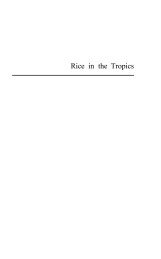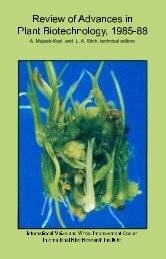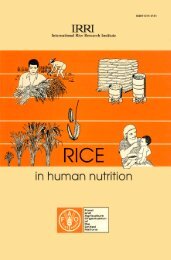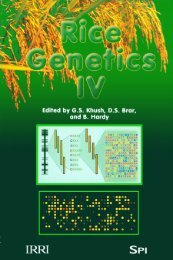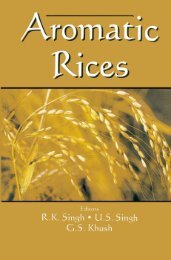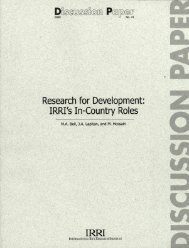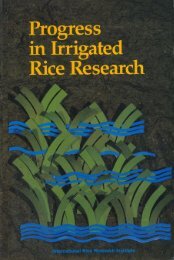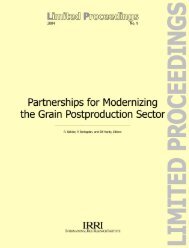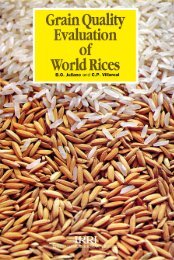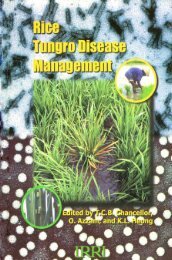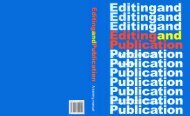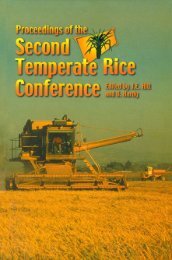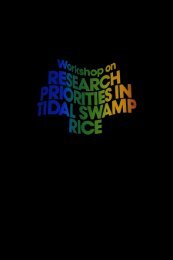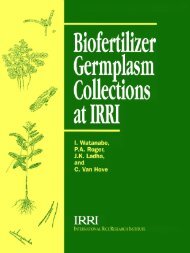An adventure in applied science - IRRI books - International Rice ...
An adventure in applied science - IRRI books - International Rice ...
An adventure in applied science - IRRI books - International Rice ...
- No tags were found...
You also want an ePaper? Increase the reach of your titles
YUMPU automatically turns print PDFs into web optimized ePapers that Google loves.
CHAPTER 2Develop<strong>in</strong>g and staff<strong>in</strong>gthe research andtra<strong>in</strong><strong>in</strong>g programThe scope of the rice research program to be developed by <strong>IRRI</strong> was firstoutl<strong>in</strong>ed by Harrar <strong>in</strong> his memorandum of October 1958 (see Appendix 1). Hehad clearly visualized a broad spectrum of research on rice. His list<strong>in</strong>g ofresearch areas need<strong>in</strong>g attention covered essentially all the activities laterundertaken by <strong>IRRI</strong>. The earlier mentioned Memorandum of Understand<strong>in</strong>g,signed on 9 December 1959 by representatives of the Ford and RockefellerFoundations and the Government of the Philipp<strong>in</strong>es, presented the generalprogram of the Institute, emphasiz<strong>in</strong>g not only basic and <strong>applied</strong> research buta tra<strong>in</strong><strong>in</strong>g program and a library and documentation service. It <strong>in</strong>cluded, also,the need for distribut<strong>in</strong>g improved genetic l<strong>in</strong>es and varieties to other researchcenters. Thus, <strong>IRRI</strong>’s mandate had been thought out <strong>in</strong> general terms beforeformal organization started.In develop<strong>in</strong>g the details of the research and tra<strong>in</strong><strong>in</strong>g program, Wortmanand I used those earlier documents as our guide. In addition, we had manydiscussions with Harrar, Hill, Gant, Moseman, and Hendricks. Furthermore,the Program Committee of the Institute’s Board of Trustees had given seriousattention to <strong>IRRI</strong>’s research imperatives when it met <strong>in</strong> April 1960.With this background, Wortman and I felt reasonably confident about theresearch programs that should be undertaken and the k<strong>in</strong>ds of scientists thatwould be required. Because I had traveled widely <strong>in</strong> Asia dur<strong>in</strong>g the 5 yearsbefore <strong>IRRI</strong>’s formation and Wortman made several trips <strong>in</strong> 1960 and 1961through the rice-grow<strong>in</strong>g countries of Asia, we were well acqua<strong>in</strong>ted withagricultural scientists there. The Rockefeller Foundation, particularly, with itsprograms <strong>in</strong> Mexico, Colombia, Chile, and India, had contacts with manyagriculturists. The Ford Foundation, too, was acqua<strong>in</strong>ted with agriculturalspecialists through its rural development programs. It was from such experienceand contacts as these that most candidates for the various positions werefound.From the outset, it was agreed that staff would be recruited from any of thefree countries of the world, but that because of Asia’s primacy <strong>in</strong> rice production,a special effort would be made to identify Asian scientists experienced <strong>in</strong>,or at least familiar with, rice research. A further pr<strong>in</strong>ciple that Wortman andI set was, <strong>in</strong> general, to employ promis<strong>in</strong>g young scientists still seek<strong>in</strong>g to makea name for themselves, rather than more mature and renowned persons whomight tend to rest on their laurels. The idea was that <strong>in</strong> the course ofestablish<strong>in</strong>g reputations through their research at <strong>IRRI</strong>, the younger scientistswould establish the reputation of the Institute as well. With few exceptions,



